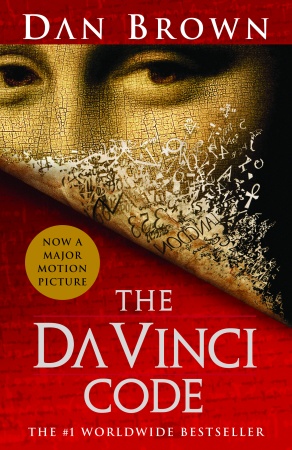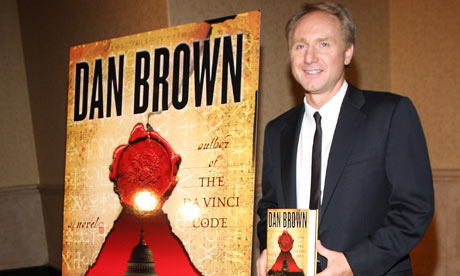The Lost Symbol by Dan Brown
newest book and our newest adventure starring Robert Langdon.
The author for The Lost Symbol as you know is Dan Brown, an extremely reputable author best known for his best selling novels, The Da Vinci Code, and Angels and Demons. Those books just so happen to be the preludes to The Lost Symbol, which I am currently blogging about now.
 |
| (Above) The Da Vinci Code, the second book in the Langdon series where Robert finds himself in a race with the Illuminati to find the "Holy Grail" and discovers many conspiracies on the way. |
A Brief Background on Dan Brown
 |
| Digital Fortress by Dan Brown |
 |
| Tom Clancy's Clear and Present Danger, the bestselling novel of the 1980s. |
“Science and religion are not at odds. Science is simply too young to understand.”
― Dan Brown, Angels & Demons
Secrecy: In The Da Vinci Code, Angels & Demons, and The Lost Symbol, Brown analyzes the secrets that the church and the government keep from society. This is not only true in the book, but in the real world as well.
Conspiracy: In the Langdon series and Digital Fortress, there are groups that conspire against society usually in a secretive way. In Robert Langdon series, the Illuminati are the antagonistic group and in Digital Fortress, it is the government who conspire by keeping surveillance of the population.
Religion: Religion is an important theme in most of Brown's books. It is also the most controversial. Dan Brown has been in lawsuits, criticized by the newspapers and the pope saying that he is preaching nonsense because people took his books too seriously. He has stated over and over again that his books are fiction and not true. The church however does not condole the reading of Brown's novels and encouraging people to not read them. Then again this is also true with the Harry Potter series.
Faith vs. Reality: In The Da Vinci Code, Angels & Demons, and The Lost Symbol, Dan Brown usually contrasts Langdon, who acts on fact and rarely on impulse or faith, with someone who will sacrifice their life for something they believe in. In The Da Vinci Code it was the Illuminati and in The Lost Symbol it is Mal'akh
Good vs. Evil: Finally, good vs. evil is always an important and classic theme present in all books; however, in Brown's books the line is much more vague. Where the antagonists usually have a different view of what is good and evil. It is usually just a different perception of the world. In The Da Vinci Code the Illuminati and Silas who are hunting down the Last Templars believe that the holy grail needs to be kept a secret in order for society to remain peaceful and loyal to Christianity and are willing to do anything to keep it that way.
Critical Literature Resources
http://galenet.galegroup.com/servlet/GLD/hits?r=d&origSearch=true&o=DataType&n=10&l=d&c=1&locID=stc23378&secondary=false&u=CLC&t=KW&s=3&NA=dan+brown
MLA:
Conspiracy: In the Langdon series and Digital Fortress, there are groups that conspire against society usually in a secretive way. In Robert Langdon series, the Illuminati are the antagonistic group and in Digital Fortress, it is the government who conspire by keeping surveillance of the population.
Religion: Religion is an important theme in most of Brown's books. It is also the most controversial. Dan Brown has been in lawsuits, criticized by the newspapers and the pope saying that he is preaching nonsense because people took his books too seriously. He has stated over and over again that his books are fiction and not true. The church however does not condole the reading of Brown's novels and encouraging people to not read them. Then again this is also true with the Harry Potter series.
Faith vs. Reality: In The Da Vinci Code, Angels & Demons, and The Lost Symbol, Dan Brown usually contrasts Langdon, who acts on fact and rarely on impulse or faith, with someone who will sacrifice their life for something they believe in. In The Da Vinci Code it was the Illuminati and in The Lost Symbol it is Mal'akh
Good vs. Evil: Finally, good vs. evil is always an important and classic theme present in all books; however, in Brown's books the line is much more vague. Where the antagonists usually have a different view of what is good and evil. It is usually just a different perception of the world. In The Da Vinci Code the Illuminati and Silas who are hunting down the Last Templars believe that the holy grail needs to be kept a secret in order for society to remain peaceful and loyal to Christianity and are willing to do anything to keep it that way.
Critical Literature Resources
http://galenet.galegroup.com/servlet/GLD/hits?r=d&origSearch=true&o=DataType&n=10&l=d&c=1&locID=stc23378&secondary=false&u=CLC&t=KW&s=3&NA=dan+brown
MLA:
Allen, Bruce, "Decoding Dan Brown's Success." InContemporary Literary Criticism 209, edited by Jeffrey W. Hunter. Farmington Hills, Mich.: Thomson Gale, 2005. Reproduced in Contemporary Literary Criticism- Select <http://galenet.galegroup.com/servlet/GLD/hitsr=d&origSearch=true&o=DataType&n=10&l=d&c=2 &locID=stc23378&secondary=false&u=CLC&t=KW&s=3&NA=dan+brown>
MLA:
"Dan Brown," in Contemporary Literary Criticism-Select. (A brief review of the author's life, works, and criticalreception<http://galenet.galegroup.com/servlet/GLD/hitsr=d&origSearch=true&o=DataType&n=10&l=d&c=1&locID=stc23378&secondary=false&u=CLC&t=KW&s=3&NA=dan+brown>
An interesting book review worth reading: http://www.time.com/time/magazine/article/0%2c9171%2c1924489%2c00.html
It breaks down Brown's attempt to revitalize the way people view Washington D.C and provide a sense of tourist attraction within The States. I would totally agree, Brown makes this message painfully obvious in many sections of the book. I didn't read the whole thing in fear of a spoiler alert, but it seemed to be accurate.
It breaks down Brown's attempt to revitalize the way people view Washington D.C and provide a sense of tourist attraction within The States. I would totally agree, Brown makes this message painfully obvious in many sections of the book. I didn't read the whole thing in fear of a spoiler alert, but it seemed to be accurate.



No comments:
Post a Comment